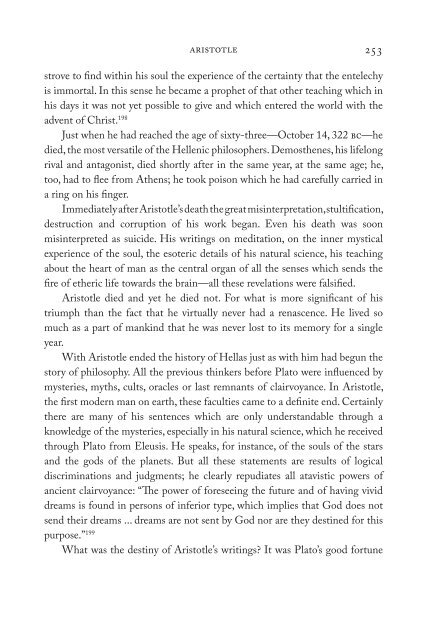The Gospel of Hellas - Research Institute for Waldorf Education
The Gospel of Hellas - Research Institute for Waldorf Education
The Gospel of Hellas - Research Institute for Waldorf Education
You also want an ePaper? Increase the reach of your titles
YUMPU automatically turns print PDFs into web optimized ePapers that Google loves.
aristotle<br />
strove to find within his soul the experience <strong>of</strong> the certainty that the entelechy<br />
is immortal. In this sense he became a prophet <strong>of</strong> that other teaching which in<br />
his days it was not yet possible to give and which entered the world with the<br />
advent <strong>of</strong> Christ. 198<br />
Just when he had reached the age <strong>of</strong> sixty-three—October 14, 322 bc—he<br />
died, the most versatile <strong>of</strong> the Hellenic philosophers. Demosthenes, his lifelong<br />
rival and antagonist, died shortly after in the same year, at the same age; he,<br />
too, had to flee from Athens; he took poison which he had carefully carried in<br />
a ring on his finger.<br />
Immediately after Aristotle’s death the great misinterpretation, stultification,<br />
destruction and corruption <strong>of</strong> his work began. Even his death was soon<br />
misinterpreted as suicide. His writings on meditation, on the inner mystical<br />
experience <strong>of</strong> the soul, the esoteric details <strong>of</strong> his natural science, his teaching<br />
about the heart <strong>of</strong> man as the central organ <strong>of</strong> all the senses which sends the<br />
fire <strong>of</strong> etheric life towards the brain—all these revelations were falsified.<br />
Aristotle died and yet he died not. For what is more significant <strong>of</strong> his<br />
triumph than the fact that he virtually never had a renascence. He lived so<br />
much as a part <strong>of</strong> mankind that he was never lost to its memory <strong>for</strong> a single<br />
year.<br />
With Aristotle ended the history <strong>of</strong> <strong>Hellas</strong> just as with him had begun the<br />
story <strong>of</strong> philosophy. All the previous thinkers be<strong>for</strong>e Plato were influenced by<br />
mysteries, myths, cults, oracles or last remnants <strong>of</strong> clairvoyance. In Aristotle,<br />
the first modern man on earth, these faculties came to a definite end. Certainly<br />
there are many <strong>of</strong> his sentences which are only understandable through a<br />
knowledge <strong>of</strong> the mysteries, especially in his natural science, which he received<br />
through Plato from Eleusis. He speaks, <strong>for</strong> instance, <strong>of</strong> the souls <strong>of</strong> the stars<br />
and the gods <strong>of</strong> the planets. But all these statements are results <strong>of</strong> logical<br />
discriminations and judgments; he clearly repudiates all atavistic powers <strong>of</strong><br />
ancient clairvoyance: “<strong>The</strong> power <strong>of</strong> <strong>for</strong>eseeing the future and <strong>of</strong> having vivid<br />
dreams is found in persons <strong>of</strong> inferior type, which implies that God does not<br />
send their dreams ... dreams are not sent by God nor are they destined <strong>for</strong> this<br />
purpose.” 199<br />
What was the destiny <strong>of</strong> Aristotle’s writings? It was Plato’s good <strong>for</strong>tune

















